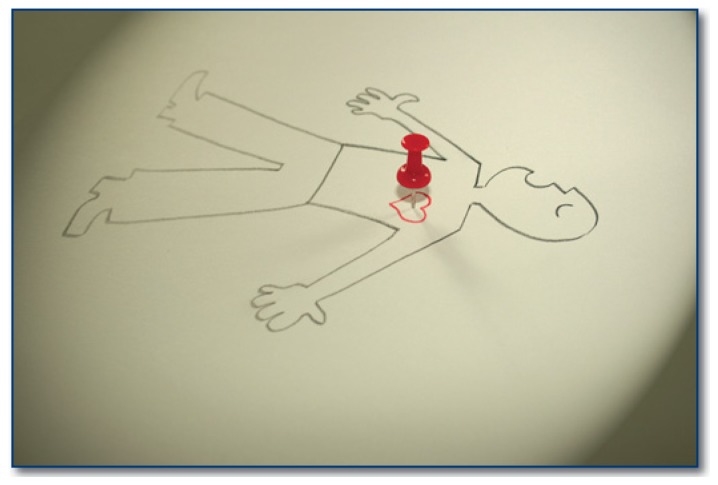Abstract
The mind-body interaction has always intrigued humans. Most people, on the basis of either intuition or personal experience, believe that emotional stress can cause or alter the course of even major physical diseases. Sir William Osler described his typical patient with angina pectoris as ‘a man whose engine is always set full speed ahead’ and described his patients with cardiac disease as ‘worriers’. In recent years there has been tangible evidence for the existence of this interaction however modern medicine is still trying to unravel its intricacies.
In this article we review the current knowledge regarding the effect of depression, anxiety disorders and the detrimental effect it has on coronary heart disease. In addition we discuss some of the proven acute psychological triggers for acute coronary syndrome.
Depression
Heart disease has considerable impact on individual’s overall health, well-being and perception of mortality. Therefore, it is not surprising that depression is the most prevalent psychiatric disease in patients with coronary heart disease (CHD). About 20% of patients with chronic CHD and 16–23% of those with acute coronary syndrome meet diagnostic criteria for major depression, while an even larger percentage has depressed mood but don’t meet diagnostic threshold of major depression.1, 2 The exact mechanisms underlying the interplay between depression and ischemic heart disease remain poorly understood and the same is true for the most effective depression treatment for cardiac patients.
There is evidence that patients with depression are more likely to develop CHD. However, whether depression is an independent risk factor for CHD is still a matter of debate. Several studies suggest an interaction between depression and the development of CHD after adjustment for traditional cardiovascular risk factors.3,4,5,6 Such studies however have been criticized for being based on registries and for incomplete adjustments for the multiple known risk factors for CHD.
Heart disease has considerable impact on individual’s overall health, well-being and perception of mortality. Therefore, it is not surprising that depression is the most prevalent psychiatric disease in patients with coronary heart disease (CHD).
In one study a cohort of 2,832 subjects who participated in the National Health Examination Follow-up Study (mean follow-up=12.4 years) and who had no history of CHD or serious illness at baseline, 11% had depressed affect; 10.8% reported moderate hopelessness, and 2.9% reported severe hopelessness. After adjustment for demographics and CHD risk factors, patients with depressed affect were at higher risk to suffer fatal CHD, relative risk 1.5 (95% CI 1.0–2.3). Moderate as well as severe levels of hopelessness also increased risk of fatal CHD, relative risk 1.6 (95% CI=1.0–2.5) and 2.1 (95% CI=1.1– 3.9), respectively. Depressed affect and hopelessness were found to be associated with an increased risk of non-fatal CHD. The authors concluded that depressed affect and hopelessness may play a causal role in the occurrence of both fatal and nonfatal CHD.3
The notion that depression increases the risk of CHD has been often explained by the hypothesis that persons with psychiatric disorders generally have other risk factors for the development of CHD. A large meta-analysis which included 21 etiologic studies and 34 prognostic studies concluded that depression has yet to be established as an independent risk factor for CHD due to wide range of measurements tools, variability in outcome measures and incomplete adjustment for conventional risk factors.7
The detrimental effect depression has on outcomes in patients with existing CHD is better established. In post-myocardial infarction (MI) patients, Frasure-Smith and colleagues demonstrated that the risk of death in the first six months after MI for patients with major depression was five times that of the nondepressed patients, with an odds ratio of 4.29.8 Lesperance and colleagues followed 896 post-MI patients for five years, evaluating depression during admission and again one year after MI, and found a significant dose-response relationship between initial in-hospital depressive symptoms and cardiac mortality.9 Depression also worsens outcomes in patients undergoing coronary artery bypass surgery (CABG). In a prospective study, which included 966 patients undergoing CABG, higher levels of depression symptoms at the time of CABG are a strong risk factor for lack of functional benefits six months after CABG.10
The effect depression has on CHD is likely secondary to combination of physiologic and behavioral factors. Multiple physiologic derangements have been described in patients with depression include high sympathetic tone and catecholamine levels, hypercortisolemia, abnormal platelet activation, increased inflammatory markers and endothelial dysfunction.11, 12,13,14 Rumsfield and Ho proposed a unifying stress-response hypothesis, which proposes that patients with depression are in essence in a constant state of perceived stress. This results in continuous upregulation of hypothalamus-pituitary-adrenal axis (HPA) and sympathetic adrenomedullary (SA) system. Stress results in serotonin dysregulation and state of depression.15,16 Persistent HPA and SA activation leads to observed abnormalities in platelet function, inflammation, and endothelial function. This hypothesis can potentially explain how depression could be a risk factor for CHD and the increase morbidity and mortality in patients with preexisting CHD.17
Behavioral factors linking depression with morbidity and mortality in CHD patients, such as poor self-care and compliance with cardiac treatment regimens, continued smoking, low motivation to change lifestyle, and low participation in cardiac rehabilitation are also important to recognize.
In patients with CHD, several small clinical trials suggest that treatment of depression successfully reduced anxiety and depression, and thus facilitated the modification of cardiac risk factors.18,19,20 Serotonine reuptake inhibitors (SSRI) are considered safe and antidepressant class of choice in patients with CHD.
Swenson and colleagues demonstrated that sertraline treatment is associated with clinically meaningful improvement in multiple quality-of-life domains in patients with acute coronary syndrome and recurrent depression.21 It is possible that SSRIs benefit in patients with CHD is primarily through modification of depression-mediated mechanisms, such as compliance with medication, diet and exercise.22 Along with their effect on depression, SSRIs have an inhibitory effect on platelet activation and, therefore, may theoretically be another mechanism for benefit seen in CHD patients.
Anxiety
The interaction between anxiety and CHD is less studied compared to that of depression and CHD. Kawachi and colleagues reported that a short phobic anxiety measure predicted nonfatal MI and fatal CHD over two years in men.23 One study found that high levels of worry were associated with nonfatal MI and fatal CHD over 20 years.24 In addition, several studies suggest that anxiety might contribute to the development of CHD in initially healthy individuals and also linked anxiety to cardiac death and MI.23,24,25 Other studies on the other hand found no association.26,27
Analysis from Normative Aging Study which included 735 men (mean age 60), found that anxiety characteristics independently and prospectively predicted MI incidence after controlling for age, education, marital status, fasting glucose, body mass index, high-density lipoprotein cholesterol, and systolic blood pressure in proportional hazards models. Phobia was associated with 1.36 relative risk for AMI while manifest anxiety increased AMI risk by 1.43 folds. These relationships remained significant after further adjusting for health behaviors (drinking, smoking, and caloric intake), medications for hypertension, high cholesterol, and diabetes during follow-up and additional psychological variables (depression, type A behavior, hostility, anger, and negative emotion). The authors concluded that anxiety-prone dispositions appear to be a robust and independent risk factor of MI among older men.28
Recently Roest and colleagues published a large meta-analysis which included twenty studies comprised of 249,846 persons. The analysis revealed that anxious persons were at risk of CHD (HR 1.26; 95% CI 1.15 to 1.38) and cardiac death (HR: 1.48; 95% CI: 1.14 to 1.92), independent of demographic variables, biological risk factors, and health behaviors. This suggests that anxiety seemingly is an independent risk factor for CHD.29
Post-traumatic stress disorder (PTSD) is one form of anxiety disorders that drew special attention in the last few years as a potential contributor to development of CHD. PTSD affects those exposed to traumatic events and is associated with re-experiencing, avoidance, and hyperarousal symptoms related to such events. Since the disorder reflects dysregulation of the stress-response system, which is associated with potentially atherogenic processes, a link between PTSD and CHD has long been speculated.
Several studies suggest that anxiety might contribute to the development of Chronic Heart Disease in initially healthy individuals and also linked anxiety to cardiac death and myocardial infarction. The risk of all-cause mortality in the first week following spousal death was two times normal.
Boscarino performed a prospective study random sample of 4,328 male Vietnam veterans, who did not have heart disease at baseline. After controlling for known coronary risk factors, study found that a diagnosis of PTSD more than doubled the risk for early-age heart disease mortality (hazard ratio= 2.25; 95% CI, 1.02–4.95).30
Adults with PTSD exhibit neuroendocrine alterations characterized by enhanced negative feedback sensitivity of glucocorticoid receptors in the stress-response system and lower than normal urinary and plasma cortisol levels. Exaggerated catecholamine responses to trauma-related stimuli have also been found in adults diagnosed with PTSD. Higher concentrations of circulating catecholamines and increased total body sympathetic activity may eventually lead to autonomic nervous system dysfunction, including diminished heart rate variability, baroreflex dysfunction, and increased QT interval variability. Chronic stress and emotional arousal may also lead to or exacerbate endothelial damage and promote the development of atherosclerosis.31,32,33
Hostility
Hostility is a personality and character trait with attitudinal (cynicism and mistrust of others), emotional (anger), and behavioral (overt and repressed aggression) components.34 Similar to the above conditions, the interaction between hostility and coronary heart disease is a matter of debate.
High hostility level has been shown to be related to increased risk of angiographically documented coronary atherosclerosis, essential hypertension, CHD incidence, and all-cause mortality. This, however, has been attributed to unhealthy lifestyle associated with this personality trait. Everson and colleagues have shown that the association between cynical distrust and cardiovascular outcomes was explained by simultaneous adjustment for smoking, alcohol consumption, physical activity, and body mass index.35 A post hoc analysis from CARDIA trial found that high hostility level may predispose young adults to coronary artery calcification independent of traditional risk factors.36 In a recent large meta-analysis which included 25 studies, anger and hostility were associated with increased CHD events in the healthy population studies (combined hazard ratio [HR]: 1.19; 95% confidence interval [CI]: 1.05 to 1.35, p =0.008) and with poor prognosis in the CHD population studies (HR: 1.24; 95% CI: 1.08 to 1.42, p =0.002). Interestingly, in this analysis the harmful effect of anger and hostility on CHD events in the healthy populations was greater in men than women.37 In the same analysis the apparently harmful effects of anger and hostility on CHD were no longer significant in either the healthy or disease populations after fully controlling for behavioral covariates such as smoking, physical activity or body mass index, and socioeconomic status. This supports the notion that if anger and hostility do influence CHD risk, effects might be primarily mediated via behavioral pathways.
Recently however, Newman and colleagues examined the relation between hostility and incident ischemic heart disease (IHD) and evaluated whether observed hostility is superior to patient-reported hostility for the prediction of IHD in a large, prospective observational study. They found that participants with any observed hostility had a greater risk of incident IHD than those without. No such relation was found for patient-reported hostility. Those with any observed hostility had a significantly greater risk of incident IHD (HR: 2.06, 95% confidence interval: 1.04 to 4.08), after adjusting for cardiovascular (age, sex, Framingham Risk Score) and psychosocial (depression, positive affect, patient-reported hostility, and anger) risk factors. The analysis demonstrated that compared with patient-reported measures, observed hostility is a superior predictor of IHD. In addition, the presence of any observed hostility at baseline was associated with a two-fold increased risk of incident IHD over 10 years of follow-up. 38
Acute Triggers
The concept of ‘triggering’ for acute myocardial infarction (AMI) emerged almost a century ago when Obraztsov and Strazhesko provided anecdotal evidence stating that ‘direct events,’ such as psychological stress or physical activity, could precipitate acute myocardial infarction. Some of the recognized psychological triggers include:
Anger
Anger has been found to be associated with increased risk AMI. Mittleman and colleagues reported that anger level corresponding with “very angry, body tense, clenching fists or teeth,” up to “furious or enraged,” was associated with a transient two-hour risk increase of 2.3-fold increase of AMI (95% CI 1.2 to 3.2) above baseline when the control was usual annual frequency. The most frequent reported contributors to anger were arguments with family members (25%), conflicts at work (22%), and legal problems (8%).39
Several well-documented physiological effects of anger make the hypothesis of triggering of myocardial infarction by an outburst of anger biologically plausible. It has been demonstrated that mental stress can increase heart rate, blood pressure, and myocardial oxygen demand.40 These effects are mediated at least in part by catecholamine secretion.40 Verrier and colleagues have reported that anger, induced in a dog model, elicited increases in coronary vascular resistance and ischemic ST segment changes.41 It has also been shown that recall of an incident that elicited anger was more potent than other mental stressors or exercise in triggering myocardial ischemia, as measured by a reduction in left ventricular ejection fraction in patients with documented coronary artery disease.42 In addition to hemodynamic effects, mental stress also has been shown to increase platelet aggregability.43
Anxiety
An elevated relative risk of 1.6 (95% CI 1.1 to 2.2) was associated with episodes of marked anxiety above the 75th percentile on an anxiety scale within the two hours before MI.39
Even stress regarding sports has been implicated as an acute trigger for AMI. Wilbert-Lampen and colleagues evaluated the risk of cardiovascular events in a German population during world Cup games when German national team played. Acute cardiovascular events were assessed in 4,279 patients. On days of matches involving the German team, the incidence of cardiac emergencies increased 2.66 times (3.26 times in men and 1.82 in women). Of those presenting with coronary events 47% had known CHD. The highest average incidence of events was observed during the first two hours after the beginning of each match. Risk of ST elevation MI was 2.49 times higher than control period. Non-ST elevation MI increased by 2.61.44
Bereavement
In a prospective study of 95,647 Finnish men and women, the risk of all-cause mortality in the first week following spousal death was two times normal. The risk of any ischemic heart disease event in that period was elevated 2.3-fold in men and 3.5-fold in women, an effect independent of age; the risk diminished dramatically by the end of the first month.45
Natural Disasters
In the week after the Los Angeles, California, earthquake of 1994, there was a 35% increase in nonfatal MI compared with the week before and a four-fold increase in sudden cardiac death on the day of the earthquake. For the six days after this spike, however, the number of sudden deaths fell below the baseline, which suggests that some of the initial deaths may have been moved forward by several days in individuals who were predisposed, rather than being excess deaths.46
Conclusion
Psychiatric disorders are common among patients with CHD. There is growing evidence that these disorders affect the overall prognosis of these patients. Recognition and treatment of psychiatric disorders in patients with CHD should be viewed as an integral part comprehensive treatment of CHD.
There remains uncertainty regarding whether psychiatric disorders can independently cause CHD or whether these disorders are merely risk markers for maladaptive behaviors, which affect compliance with therapy and eventually outcomes. Irrespective whether the relationship is causal or not, there is a need for improved recognition and treatment of psychiatric disorders. This early recognition and treatment of these disorders will have profound effect on patient’s overall well-being and health which may include deceasing risks of CHD.
Biography
Arun Kumar, MD, is Assistant Professor of Clinical Medicine and Director of the Cardiac Intensive Care Unit at the University of Missouri School of Medicine. Maen Nusair, MD, and Ashraf Al-dadah, MD, are cardiovascular Fellows the University of Missouri School of Medicine.
Contact: kumararun@health.missouri.edu

Footnotes
Disclosure
None reported.
References
References exceeded space limits. Email Liz Fleenor at lfleenor@msma.org for listing.




